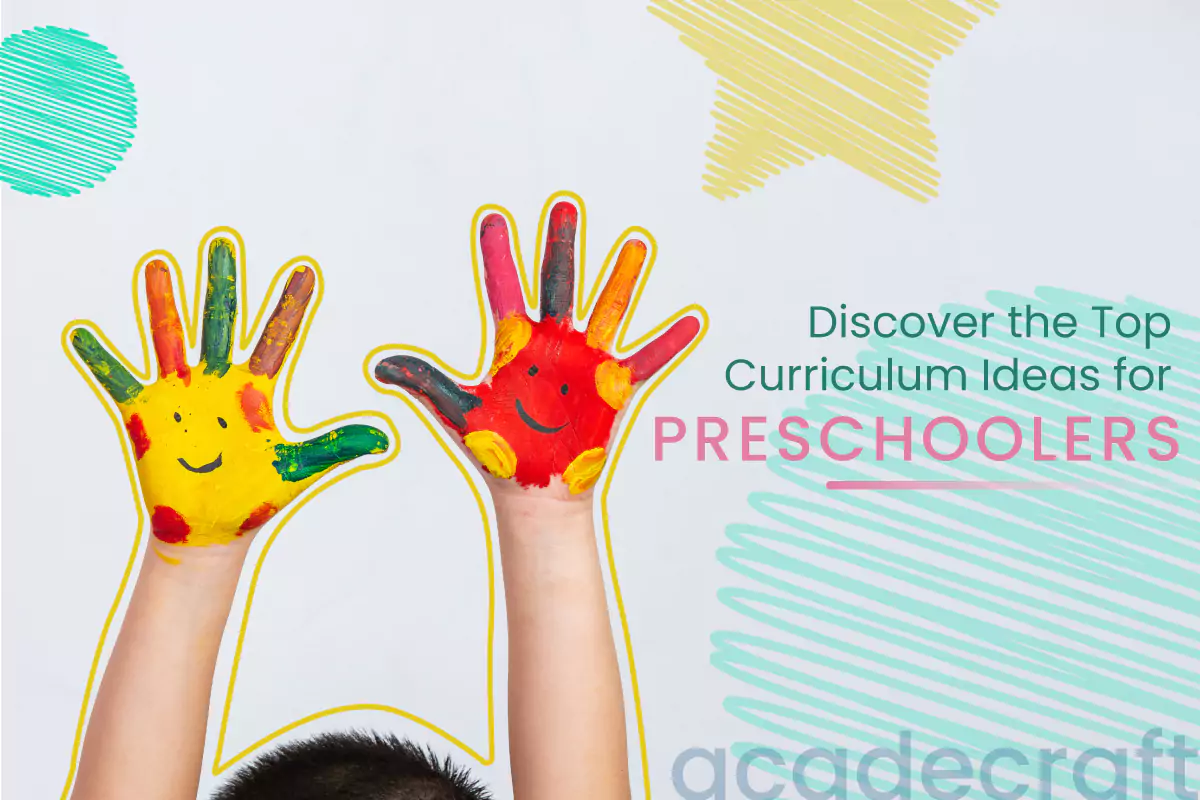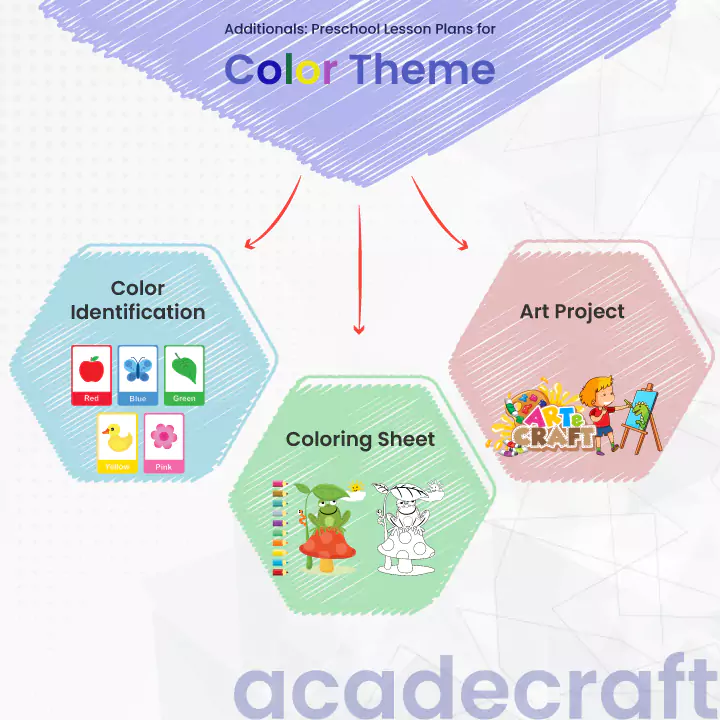
Children can learn and develop in a fun and interactive learning environment at preschool. They are exposed to various subjects in preschool curricula, including math, science, reading, writing, arts, music, drama, and social-emotional development. It is when a child’s physical and mental development occurs, including those with special needs due to various impairments. The comprehensive capabilities that arise in the age group of 3-6 years are the essentials for later success in school life.
The National Council of Educational Research and Training has developed the Preschool Curriculum. This curriculum assists teachers, administrators, policy planners, and other stakeholders in providing good quality preschool education to children. As a result, the curriculum creates a fun-filled learning environment where children can learn and grow in preschool.
A well-rounded preschool curriculum can also make it easier for teachers to follow up on various preschool curriculum topics In this blog, you will explore some of the hidden and most useful curriculum ideas for preschoolers, accompanied by innovative examples to help you understand how to incorporate these topics effectively.
Many parents have recently acknowledged the importance of enrolling their children in early childhood education courses to improve their future learning and development. It's important to make an informed choice for what fits your child and what suits them best since many preschool curricula and approaches focus on the stage of initial childhood development. Apart from that, the variety of options and the many terms used for early childhood curriculum- preschool, nursery, and kindergarten- only add to the confusion.
Introducing preschoolers to the diverse world of animals and their habitats is fascinating and an excellent opportunity to teach them about the natural world. You can organize a "Zoo Day" where children dress up as their favorite animals and learn about their characteristics, diet, and where they live. Set up different habitats in the classroom, such as a jungle, ocean, or desert, and let the children explore and interact with the environment. Use books, puzzles, and interactive games to reinforce their learning and encourage them to ask questions.
Teaching preschoolers about community helpers is a significant way to instruct them in various professions and teamwork. You can arrange a "Career Day" where children can play the role of community helpers, such as doctors, firefighters, or police officers. Invite guest speakers or parents working in these professions to share their experiences and answer questions. Organize a dramatic play where children can pretend to be different community helpers, providing costumes and props to enhance their imaginative play and knowledge of different roles.
Exploring the four seasons and weather phenomena helps preschoolers understand environmental changes and develop observation skills. Create a "Weather Station" in the classroom with a pretend weather map, thermometer, and rain gauge. Each day, discuss the weather and record the temperature and other observations.
Incorporate hands-on activities like creating weather crafts, singing songs about seasons, and reading books about weather-related topics. Take children on nature walks to observe seasonal changes and discuss how weather affects plants, animals, and our daily lives.
Promoting nutrition and healthy habits at a very young age plants a lifelong seed of practice. Create a "Healthy Habits Corner" in the classroom with visuals and props related to exercise, hygiene, and healthy eating.
They organize cooking activities where children learn to prepare simple and nutrition-rich snacks like fruit, vegetable wraps, or kebabs. Use picture books, posters, and interactive and engaging games to teach them the importance of brushing their teeth, eating a balanced diet, and staying active.
Encourage children to discuss healthy habits and share the experiences they practice at their home.
Encourage young children's interest in the universe by exploring outer space. Construct a "Space Station" in the classroom with a rocket ship, astronaut attire, and bright stars that glow in the dark. Make them learn about the planets, solar systems, and constellations through hands-on activities.
Create a sensory bin filled with space-themed objects or moon sand for children to explore. Use technology to show them real space and engage in discussions about astronauts and space missions. Encourage children to create their artwork or planets models using various materials.
Introducing preschoolers to different cultural celebrations fosters an appreciation for diversity and promotes inclusivity. Explore festivals like Diwali, Christmas, Chinese New Year, or Thanksgiving. Create a multicultural corner with artifacts, traditional clothing, and crafts from various cultures.
Engage children in learning traditional dances, songs, or greetings in different countries. Encourage community members and parents to share their cultural traditions and stories with children. Additionally, invite children to participate in hands-on activities showcasing different celebrations and to sample traditional foods.
Read Also: What is Curriculum Development? Why is it Important?
Lesson planning is an essential aspect for preschool teachers. It helps them organize activities for the upcoming weeks, set milestones and goals for their students, and develop teaching strategies that can support the children's overall learning and development. Let us explore the Color Theme lesson plan for preschool children.
This knowledge can then carry forward through various activities:
Distribute the color flashcards to the students, ensuring each has at least one color card. Call out a color, such as “Who has the yellow card?” and have the student, with a corresponding flashcard or picture, hold it up for everyone else to see.
Repeat this activity several times, using different colors each time to encourage active participation from all the students. Also, ask them to take turns holding up the cards and identifying the colors. This activity will strengthen their vocabulary.
This activity will open doors for students to strengthen their color recognition ability. You can give each student a coloring sheet featuring different objects or animals to do this. Ensure that images on the coloring sheet include different colors to explore.
Instruct them well to color the objects using a variety of colors and motivate them to be creative and imaginative while using various colors for each project. You can use questions like “What color are you using to color trees?” or “Can you find a different color for the butterfly’s wings?” This activity will allow the students to improve their color recognition ability and practice coloring within lines.
Children actively take part in art and crafts-related activities. You can provide them with stationery items and ask them to create art out of them. Ensure they have a blank canvas with ample space to create art. Show them a sample example like a simple shape (circle or a square) cut out from a different colored paper.
Make them understand they will create colorful artwork using various shapes and colors. Guide students to use scissors to cut out shapes like triangles, circles, squares, and rectangles. Make them stick these shapes using glue to create an artwork. This activity will promote creativity, color mixing, and fine motor skills.
Interesting Read: What is K12 Curriculum Development
In this blog, we have covered curriculum topics for preschoolers. By following these tips, you can create an effective and engaging preschool curriculum. It's essential to incorporate diverse learning practices in the curriculum to provide a comprehensive education for preschoolers.
This approach helps build a strong foundation of knowledge and skills while teaching children how to learn and think critically. Our curriculum development services help teachers with lesson plans. Education experts with experience in curriculum design, instructional strategies, and educational standards offer the services.
When selecting curriculum topics, it's crucial to consider the children's interests and choose topics that align with their developmental stage. Preschool teachers can use resources such as books, websites, and professional organizations to identify curriculum topic ideas.
Teachers can create an environment that encourages children to explore and grow their knowledge by focusing on topics relevant to their age group. Not just curriculum, we are also efficient in assessment development services. Connect with us today to create and lead a better educational experience.
Share